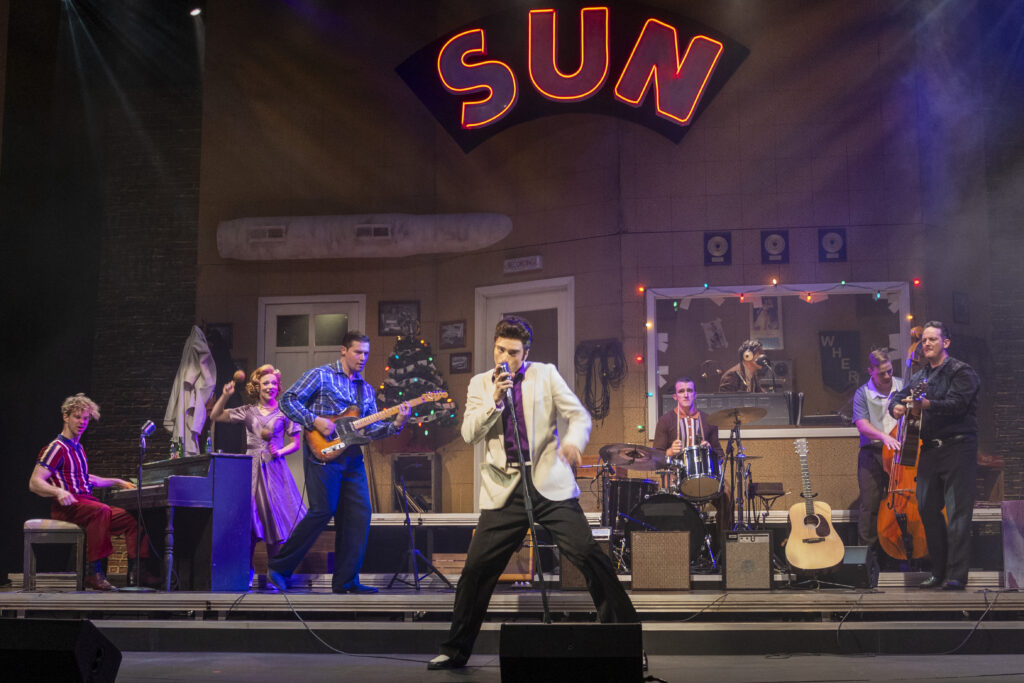Even seven decades after the musical style first began to emerge, it’s not a stretch to say that “rock ’n’ roll is here to stay,” and audiences at Riverside Theatre’s electrifying production of “Million Dollar Quartet” are likely to agree.
Known as a jukebox musical, it centers on the “King of Rockabilly,” Carl Perkins; “the Killer,” Jerry Lee Lewis; the “Man in Black,” Johnny Cash; and the “King of Rock ’n’ Roll,” Elvis Presley. In the early/mid-1950s they were all up-and-coming musical legends in their early 20s. On Dec. 4, 1956, “for the first and only time in rock ’n’ roll history,” they found themselves in an impromptu jam session at Sun Records.
Although based on an actual event, with recordings to prove it, some liberties were taken. Colin Escott, who co-wrote the show’s book with Floyd Mutrux, told Playbill in 2010 that they had taken 18 months of history and condensed it into one night.
The recording studio was the domain of producer Sam Phillips, the “Father of Rock ’n’ Roll,” who discovered numerous others, including Roy Orbison and Charlie Rich. All raised in the South, the musicians and Phillips were heavily influenced by the rhythm and blues of the area’s Black laborers and gospel music.
Although Phillips, played with panache by Joel Ripka, was barely a decade older than the four, he was like a father figure to them, letting them develop their own distinctive styles as he fostered their talents to the point that they were all in hot demand.
“Beware the curse of the answered prayer,” Phillips says to Elvis, referencing that a year earlier, RCA Victor had made Phillips an offer for Elvis that neither of them could refuse. In the meantime, Cash and Perkins were thinking about leaving Sun for greener pastures.
Fortunately for future generations of rock ’n’ roll lovers though, Phillips had the foresight to capture the historical jam session in perpetuity.
The energy level in the musical is high from the outset, with the company, all Riverside newbies, launching into a rousing rendition of “Blue Suede Shoes.” Written and first recorded by Perkins (despite now being synonymous with Presley), the song quickly went to No. 1 and put Sun Records on the map.
As the musicians head offstage, Phillips sets the scene for that magical night. And considering that each was trying to climb to the top of the charts, it was not without its tensions.
Sean McGibbon lives up to the description of Jerry Lee Lewis as “rock ’n’ roll’s first great wild man,” expertly playing “Real Wild Child” on the ‘pI-ano.’ McGibbon channels the brash impudence of Lewis, who had not yet become a household name. And boy, can he pound those keys, with hands and feet, upside down and backwards, not to mention unbridled energy.
Perkins, played compellingly by Chance Michael Wall, was at the studio to record “Matchbox” and “Who Do You Love.” Phillips had brought in Lewis to liven up the recording but gets more than he bargained for as sparks begin to fly. Lewis can’t help himself, continually riffing and taunting Perkins, who tries to focus on his craft, clearly not pleased with the upstart’s contributions.
Sky Seals has perfected the persona of Johnny Cash, convincingly performing such songs as “Folsom Prison Blues” and “I Walk the Line” in a deep, rich bass-baritone. This is his 18th production of the show, and he has been nominated for a Carbonell Award for his 2022 portrayal of the musician at Actor’s Playhouse in Coral Gables.
As Elvis, Alessandro Viviano may not have perfected Presley’s sultry stare or sneer, but he definitely has the vocal range and capacity, and serves up plenty of gyrations and sex appeal with his renditions of “That’s All Right” and “Hound Dog.”
The fifth singer in the ensemble is essentially a footnote in history, but you wouldn’t know it after hearing the vocal chops of Lucy Rhoades as Dyanne, who enters the recording studio on Presley’s arm. Dyanne is based on Marilyn Evans, a Las Vegas chorus dancer Elvis met while performing there and, while their relationship was short-lived, her place in the spotlight was not. As she alluringly sings “Fever,” Rhoades flirts with the musicians, at one point melting onto the bass, and later holds her own while singing with the boys.
Not to be overlooked on the musical front are bass player Ian Haegele, who plays the part of Perkins’ brother, Jay, and drummer Zach Cossman as Fluke, both of whom wonderfully provide backup for the vocalists and have their own talents showcased as well. Ripka, too, surprises us later, playing a mean harmonica.
New York City-based director Greg Santos keeps the action moving with alacrity, giving each performer plenty of opportunity to shine, and they do. Music director Eric Scott Anthony returns to Riverside for the third time, the last performing in the 2017 production of “Hank Williams: Lost Highway.”
Scenic/projection designer Nicholas Hussong gives us a convincing set, befitting the nascent studio, and continually projects scenes and photos of the era and the early lives of the musicians in the background.
Costume designer Anna Christine Hillbery, who outfitted each person on stage with at least one vintage piece, and lighting designer William Gibbons Brown are spot-on throughout, but both truly shine in the sparkling, high-octane finale. And as always, kudos to sound designer Craig Beyrooti, a Riverside regular, for his expertise.
“Million Dollar Quartet” runs through Nov. 12 on the Stark Stage at Riverside Theatre, 3250 Riverside Dr., Vero Beach. Tickets start at $45. Call 772-231-6990 or visit RiversideTheatre.com.
Photos provided

